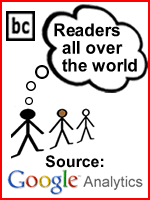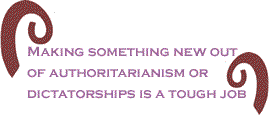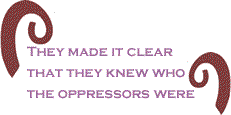 Change
is coming in the United States of America.
Change
is coming in the United States of America.
There are some signs of change, but it’s hard to know in what direction
it will go. There has been a slight uptick in the percentage
of workers in unions, but it’s a mere fraction of a percent,
so it would be premature to say that American workers
are finally on the march and will soon be at bargaining
tables across the nation.
Occupy Wall Street and other “branches” of the “Occupy” idea are
still functioning, although they have been kicked out
of the public spaces they occupied last fall. The movement,
made up largely of young men and women, has moved inside
and are working in circumstances that the majority of
Americans can understand. Some of them have offices, now,
but they continue to bring the attention of the nation
to the disparity in wealth and the powerlessness of a
majority of the electorate in our political system.
Millions of ordinary people continue to suffer, especially the unemployed,
the underemployed, the elderly, the disabled, and the
young who are burdened beyond their capacity to repay
their debt for what they were told is vital for their
success, an education.
We have seen reform movements come and go, both on the streets and
even in Congress over several generations, all aimed at
bringing some equity to our system of pay (compensation),
the economic system, the way we tax income, and the way
we don’t tax wealth. There has always been a lot of noise
and a flurry of movement, but no real action that has
resulted in fundamental change.
With a glance at our situation, one can see that the same people
are in power, that they still write the laws, and they
still rule the economy. They are the 1 percent that is
being discussed everywhere. They have had great power
over the lives of the people for generations and they
still wield that power. They still own the wealth and
direct the use of the money that is held by the other
99 percent.
 Those
in the Occupy movement had hoped that their raising of
the issues would catch fire and that the people would
move into the streets to show public officials and the
heads of powerful Corporate America that they are not
going to take it anymore. The flow of the citizenry into
the streets to demonstrate their anger has not happened,
but that doesn’t mean that it won’t happen.
Those
in the Occupy movement had hoped that their raising of
the issues would catch fire and that the people would
move into the streets to show public officials and the
heads of powerful Corporate America that they are not
going to take it anymore. The flow of the citizenry into
the streets to demonstrate their anger has not happened,
but that doesn’t mean that it won’t happen.
Organizers of the first Occupy group, in New York City, had seen the “Arab Spring” and had observed the amazing
action of millions of citizens rising up and protesting
their authoritarian or dictatorial rulers. And they saw
the success of ridding those countries of those who kept
the people down, kept them in their place, kept them from
the freedom that they wanted, both in politics and in
the economic life of their countries. In most of the uprisings
of the Arab Spring, it was done with a minimum of bloodshed,
although there were deaths, mostly among the protesters.
After all they didn’t have the guns and other weaponry.
Libya
was one exception, when the fighting turned into a civil
war, prompted and assisted by air power and support from
other countries, but that conflict faded from the world’s
press within a few weeks after the killing of Muammar
Ghaddafi.
The aftermath of the Arab Spring in most of the countries is another
matter. Making something new out of authoritarianism or
dictatorships, by people who have little experience in
governing, is a tough job. In Egypt,
a year after the people rose up against Hosni Mubarak
and ousted him from 30 years in power, the people are
rising again because the army looks as if it is not willing
to turn over the reins of power to civilians. They remember
that Mubarak took power in the same manner.  No
matter the country, protesters are on the short end of
power and suffer the most casualties, but they continue
to fight for their right to some measure of self-determination.
No
matter the country, protesters are on the short end of
power and suffer the most casualties, but they continue
to fight for their right to some measure of self-determination.
Who would have thought that the vicious apartheid system in South Africa would
finally fall, without an open revolution? Revolutionary
change came, but only after decades of struggle and suffering.
And the Berlin Wall fell without a shot being fired…another
revolutionary act by the people on both sides, again,
though, after many years of struggle. Such examples are
numerous, although there have been bloody risings of the
people, some resulting in war crimes that have yet to
be prosecuted.
In countries of the European Union there have been recent stirrings
of peaceful revolution, as there has been in Israel, a democratic country in what was once
a sea of dictatorships, royal rule, and authoritarian
governments. Syria
is very close to open rebellion, even though Assad has
been vicious in his response to the people’s protests.
One could say that the stirrings have occurred in the
U.S.,
as well. There was the Tea Party movement, inspired and
supported by billionaires trying to maintain the status
quo. Tea partiers even brought their guns to demonstrations,
but there didn’t ever seem to be a question of their use.
Now, the Occupy movement has brought the attention of the nation
to the gross disparity in wealth between the 1 percent
and the other 99 percent (most of us). The country’s Right
Wing has viewed this with alarm. The front-runner for
the Republican nomination for president, Mitt Romney,
said last fall that the rhetoric of the Occupy movements
that sprang up around the country amounted to “class warfare.”
In Florida last
October, he said, “I think it’s (class warfare) dangerous.”
In the same month, House Majority Leader Eric Cantor,
a Republican, expressed alarm at the “growing mobs” that
were sowing division in the country.

What they were doing that so upset the Republicans and their base
is that the Occupy movement was attempting to shine a
light on the disparity in wealth and political power.
Romney, Newt Gingrich, his lead opponent in the race for
the GOP nomination, and those in power, in general, are
denouncing the protesters and their exercise of their
First Amendment rights to show how the disparity has crippled
social programs that serve those most in need. For Romney
and the rest, that’s “class warfare.”
During the past 40 years, when the disparity was being constructed
by the rich and powerful, so that the vast majority of
Americans was being left out, that wasn’t class warfare.
Rather, it was an adjustment upward of the wealth of the
nation, to the extent that, today, the top 1 percent of
Americans, in 2007, owned 34.6 of all privately held wealth,
and the next 19 percent had 50.5 percent, which left only
about 15 percent of the wealth for the bottom 80 percent
of Americans, according to Professor G. William Domhoff
of University of California, Santa Cruz.
This disparity has taken time to construct and few people (with the
possible exception of some sociologists, some on the margins
of politics, and especially, trade unionists who had to
negotiate contracts for workers with the very people who
have carefully caused the disparity in both wealth and
income) ever called it class warfare. Now that there is
a general discussion of the philosophy and goals of the
rich and powerful, it’s class warfare.
 The
Mitt Romneys and Newt Gingriches of the nation don’t want
this discussion. The GOP leaders of both the U.S. House
and Senate do not want this discussion. They are always
rumbling about “class warfare,” and they will fight to
the end to maintain the status quo. That’s why they are
afraid of the Occupy movement and all of the movements
that came before it. The people are responding to the
discussion and debate and that could be dangerous. Across
the country, mayors and governors have pushed to have
the Occupy encampments removed, as if that will minimize
the intensity of the debate. They have succeeded, in part.
Just in the past week, they removed the encampment in
the District
of Columbia and plunged a taser into the back of a young
man who was being held by two officers and who was not
resisting in any measurable way. In the past weekend,
some 400 Occupy participants were arrested in Oakland,
Cal.
The
Mitt Romneys and Newt Gingriches of the nation don’t want
this discussion. The GOP leaders of both the U.S. House
and Senate do not want this discussion. They are always
rumbling about “class warfare,” and they will fight to
the end to maintain the status quo. That’s why they are
afraid of the Occupy movement and all of the movements
that came before it. The people are responding to the
discussion and debate and that could be dangerous. Across
the country, mayors and governors have pushed to have
the Occupy encampments removed, as if that will minimize
the intensity of the debate. They have succeeded, in part.
Just in the past week, they removed the encampment in
the District
of Columbia and plunged a taser into the back of a young
man who was being held by two officers and who was not
resisting in any measurable way. In the past weekend,
some 400 Occupy participants were arrested in Oakland,
Cal.
Even in countries with no tradition of what The West calls democracy,
the people have managed to change the direction of their
nations just by the force of their massed presence and
because they made it clear that they knew who the oppressors
were. In the U.S., there is a tradition of democracy
and, for many observers around the world, it seems inconceivable
that a nation of 310 million could be fleeced of their
living standard and allow the wealth to be concentrated
in the top 1 percent. It is just that kind of imbalance
that has caused disruption and revolution elsewhere in
the world.
When President John F. Kennedy said, “Those who make peaceful revolution
impossible make violent revolution inevitable,” he was
addressing the diplomats of the Latin American nations,
in observance of the first anniversary of the Alliance
for Progress, in 1962. He was not thinking of his own
country at the time, and yet the reduction of the U.S.
working and middle classes was under way, but not yet
in full swing here, as it was in the countries to the
south.

Americans are at that time and place in which, had he lived to see
this era, Kennedy might well be warning that the people
can only endure so much before there is a response or
a reaction to their treatment at the hands of the rich
and powerful. Those who call it class warfare only when
the people call them out might well go back and read what
Kennedy was talking about, because there were plenty of
petty dictators and tyrants (most of them supported by
the U.S.), who had oppressed and exploited their people.
In our time, their role is played by CEOs and a majority
of politicians.
 BlackCommentator.com
Columnist, John Funiciello, is a labor organizer and former
union organizer. His union work started when he became
a local president of The Newspaper Guild in the early
1970s. He was a reporter for 14 years for newspapers in
New York State. In
addition to labor work, he is organizing family farmers
as they struggle to stay on the land under enormous pressure
from factory food producers and land developers. Click
here
to contact Mr. Funiciello.
BlackCommentator.com
Columnist, John Funiciello, is a labor organizer and former
union organizer. His union work started when he became
a local president of The Newspaper Guild in the early
1970s. He was a reporter for 14 years for newspapers in
New York State. In
addition to labor work, he is organizing family farmers
as they struggle to stay on the land under enormous pressure
from factory food producers and land developers. Click
here
to contact Mr. Funiciello.

